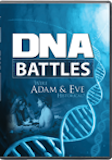Unnecessary DNA
ScienceDaily: “Mice Thrive Missing [sic] Ancient DNA Sequences”
Scientists in the U.S. Department of Energy’s Lawrence Berkeley National Laboratory and Joint Genome Institute were faced with a puzzle: what was the explanation behind what are called “ultraconserved elements,” i.e., identical DNA sequences in the genomes of mice, rats, and humans, 200 base pairs or longer, that have been “perfectly conserved since the last common ancestor of these species”?
The researchers hypothesized that since the sequence was identical (and since, according to their evolutionary assumptions, it had remained so for 85 million years), it must guide crucial functions. To test their hypothesis, the researchers decided to knock out the sequence in lab mice and see if the mice either died or were unable to reproduce viable offspring.
The scientists were “really surpris[ed],” then, when the mice without the sequence “showed almost no ill effects at all.”
The scientists were “really surpris[ed],” then, when the mice without the sequence “showed almost no ill effects at all.” Experiment leader Nadav Ahituv describes the test mice as “not only viable and fertile but show[ing] no critical abnormalities in growth, longevity, pathology, or metabolism.”
So why, then, have these sequences remained unchanged for eons of time? That’s the question evolutionists must now answer; given the rate of mutations and the time evolutionists think was involved, it simply doesn’t make sense that the region would not have diverged genetically in any of the organisms if it weren't somehow essential. The adapted news release notes that one such region, “[t]he 731-base pair sequence, uc467, should normally have accumulated some 334 nucleotide changes in the more than 80 million years that mice, rats, and humans have been evolving along separate paths.”
Study coauthor Len Pennacchio presents the evolutionists’ answer: that it is only over the long, long term that a mutated version of the region is fatal:
“Evolution and natural selection do not happen overnight. [...] The deletion of these elements likely has relatively mild effects on fitness that are gradually selected against over time—several or more generations from when they arise—but not on observable time scales.”
Although it would take a long time, this hypothesis is testable in the lab, and perhaps it will someday be put to the test. In the meantime, this explanation would still seem to suggest a less-fit-but-surviving version of the sequence would be floating out there. (Not to mention the fact that the a typical evolutionist answer is that if you don't get the answer you need, just throw more time at it.)
Ahituv, meanwhile, suggests that perhaps redundancy is what allows the mice without the sequence to survive—that is, some other genomic region is taking over and fulfilling the biological function. But again, this raises the question of why this region would be so conserved.
Ultimately, the conclusion we arrive at is that the supposed millions of years of evolution—which would have accounted for the potential divergence between the genomes—have not occurred. In fact, a recent, special creation, followed by the Fall (Genesis 3), is a better explanation of the genomic origin, some commonality yet significant differences between kinds, and then the subsequent corruption of that information.
For more information:
Remember, if you see a news story that might merit some attention, let us know about it! (Note: if the story originates from the Associated Press, Fox News, MSNBC, the New York Times, or another major national media outlet, we will most likely have already heard about it.) And thanks to all of our readers who have submitted great news tips to us.
(Please note that links will take you directly to the source. Answers in Genesis is not responsible for content on the websites to which we refer. For more information, please see our Privacy Policy.)
Recommended Resources

Answers in Genesis is an apologetics ministry, dedicated to helping Christians defend their faith and proclaim the good news of Jesus Christ.
- Customer Service 800.778.3390
- Available Monday–Friday | 9 AM–5 PM ET
- © 2026 Answers in Genesis





